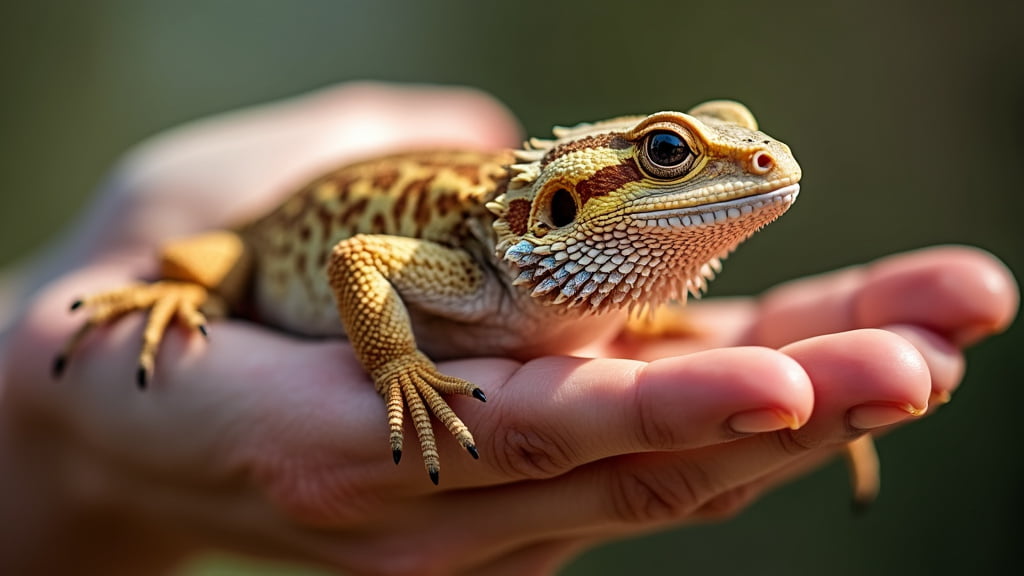Tools for Safe Handling of Bearded Dragons
Owning a bearded dragon can be an incredibly rewarding experience, but ensuring their safety during handling is paramount. Over my many years of keeping these fascinating reptiles, I’ve learned that the right tools and techniques significantly enhance both the bearded dragon’s and owner’s experience. This comprehensive guide aims to provide you with essential handling tools, tips, and methods to safely interact with your bearded dragon.
Bearded Dragon Handling Essentials
Handling Gloves
Why Use Gloves?
Handling gloves might seem an over-cautious addition to your reptile care kit, but they offer significant benefits. Gloves protect both your bearded dragon and you, the handler, from any accidental scratches or nips, particularly when the dragon is stressed or not used to being handled.
Types of Gloves
- Leather Gloves: Ideal for heavy-duty protection.
- Cotton Gloves: Perfect for sensitive handling and maintaining a natural feel.
- Nitrile Gloves: Great for hygiene and easy disposable use.
From my personal experience, I’ve found that cotton gloves offer a balanced combination of protection and sensitivity, ensuring your bearded dragon feels secure without any harsh textures.
Handling Towels
Why Towels Are Useful
Towels can be a versatile tool in reptile handling. They provide a soft, gentle surface for your bearded dragon to rest on during pick-up and handling. Additionally, towels can help catch any sudden bowel movements, which is quite common when your bearded dragon gets nervous.
Using Towels Effectively
- Always use a clean, soft towel.
- Ensure the towel is large enough to wrap around the bearded dragon comfortably.
- Gently scoop the dragon up with the towel, ensuring that it feels secure and supported.
Handling Hooks and Probes
When to Use Hooks and Probes
While these tools might be more commonly associated with snake handling, they can be incredibly useful for larger bearded dragons or those that may have a defensive temperament. Hooks and probes allow you to gently coax your bearded dragon out of their enclosure without directly putting your hands in, reducing stress for the pet and avoiding potential bites.
Choosing the Right Tools
- Soft-tipped Probes: Ideal for gently prompting your bearded dragon without causing harm.
- Adjustable Reptile Hooks: Offer flexibility in length, making them useful for various sizes of enclosures.
Mastering the Art of Handling
Building Trust
Slow Acclimatisation
Building trust with your bearded dragon is the cornerstone of safe handling. Start by placing your hand in their enclosure but not trying to pick them up immediately. Over time, this will help them get used to your presence.
Signs of Comfort
- Relaxed Body Language: A calm, relaxed posture is a good sign.
- Curiosity: If they approach your hand, it’s a positive signal of trust.
- Minimal Tail Flicks: Excessive tail flicking often indicates discomfort or stress.
Proper Lifting Techniques
Supporting Their Body
Always support your bearded dragon’s entire body to ensure they feel secure. Use both hands – one under their chest and one under their hind legs. Remember, a frightened bearded dragon may try to wriggle free, so ensure a firm but gentle grip.
Avoiding Common Mistakes
- Never Lift by the Tail: Bearded dragons’ tails can easily be injured.
- Don’t Squeeze: Even though a gentle firm grip is necessary, avoid putting too much pressure on their delicate frames.
Post-handling Care
Watch for Stress Indicators
After handling, always observe your bearded dragon for any signs of stress or discomfort. These can include:
- Changes in Eating Habits: A loss of appetite can indicate stress.
- Erratic Behaviour: More hiding or aggressive behaviour could be signs they’re undergoing stress.
Maintaining Hygiene
Always wash your hands before and after handling your bearded dragon. This not only protects you from any germs but also keeps your dragon safe from external contaminants.
Conclusion
Safe handling of bearded dragons involves a combination of the right tools, trust-building exercises, and careful techniques. By investing in quality handling gloves, utilising towels, and occasionally using hooks and probes, you can create a stress-free environment for your bearded dragon. Remember, every bearded dragon is unique; patience is key to ensuring a happy and healthy pet.
For specific health concerns or persistent issues, always refer to a professional veterinarian who specialises in reptiles.
Meta Description for SEO
Discover essential tools and techniques for safely handling bearded dragons. Learn expert tips on using gloves, towels, and hooks to ensure stress-free interactions with your reptile friend.
Internal Links
External Links
With the right preparation and care, handling your bearded dragon can become a harmonious experience that strengthens the bond with your scaly friend. Enjoy the journey!
If you’re looking for quality handling gloves, check out these options on Amazon.

